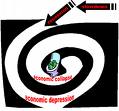Financial Crisis in Dubai: Towards a Nightmare Scenario?

The default in Dubai is not the beginning of Financial Meltdown 2. Don’t look for dominoes here. Yes, it does raise serious questions about the vast debt-overhang in emerging economies–particularly East Europe. But, this is not a “sovereign default” in the strict sense, nor is there any great risk of contagion. Oil-rich Abu Dhabi is loaded with liquid assets, possibly as much as $800 billion. They could pay off Dubai World’s measly $60 billion debt without batting an eye. But Abu Dhabi wants to send its wastrel younger brother a wake-up-call by forcing Dubai to restructure its debt. That means that banks, bondholders and contractors will have to take a haircut, which is not surprising given the abysmal condition of the commercial real estate market.
Dubai World owners were caught up in the same heady debt-fueled commercial construction-binge that swept across the United States. The problem can be traced back to lax lending standards and low interest rates. Now demand has fallen off a cliff and credit is getting tighter. Dubai World can’t roll over its debt or meet its obligations. That’s what typically happens when credit bubbles burst.
On Thursday, Bank of America analysts issued a statement: “One cannot rule out — as a tail-risk — a case where this would escalate into a major sovereign default problem, which would then resonate across global emerging markets in the same way that Argentina did in the early 2000s or Russia in the late 1990s.”
This is nonsense. There will be no sovereign default. Abu Dhabi is not going to send global markets into a nosedive to save a few billion dollars. B of A is blowing smoke. Oil has already slipped $3 per barrel since the crisis began. There will probably be a tentative resolution by the time the markets open on Monday. That doesn’t mean that there aren’t important lessons to be learned from this latest financial calamity. There are.
First, it illustrates that the financial crisis is not over—households, businesses and countries are still deleveraging. This ongoing process will slow spending and increase defaults, bankruptcies and foreclosures. Government guarantees and stimulus programs will not reverse prevailing trends. More incidents like Dubai World should be expected. These “credit events” will disrupt the recovery and spur greater risk-aversion which will push stocks downward.
Arnab Das of RGE Monitor sums it up like this: “We’re bound to see a rise in risk aversion. The Dubai situation signifies that although the major central banks around the world have stabilized the financial system, they can’t make all the excesses simply disappear. We still have to work out those balance sheet stresses. The recovery is proceeding, but significant challenges still lie ahead.” (Bloomberg News)
Second, when these incidents take place, there’s likely to considerable collateral damage from the unregulated insurance policies (credit default swaps) which underwrite the bonds. These CDS derivatives are not sold on a public exchange so no one knows who holds them, in what amount, or whether the issuer has sufficient capital reserves to pay off claims. We should expect a repeat of AIG over and over again (although smaller) until the system is either regulated or CDS are banned. The bottom line, is that the current financial architecture is not designed to work; it is designed to make a handful of speculators very rich. These speculators own congress, the White House and the financial media, which is why there has been no meaningful change in regulations.
Dubai is not Argentina. There will be a resolution and contractors will get paid, although not “in full.” There will be losses. Big losses. But no contagion.
News of Dubai’s payment “standstill” roiled global markets where investor confidence was already thin. The dollar and yen strengthened and US Treasurys surged. The “flight to safety” is making it doubly hard for the Fed to reflate asset prices. Dubai-like credit events make investors jittery and they pull in their horns. That extends the slump and deepens the recession.
If the Dubai crisis drags on, the dollar will get stronger and the flourishing carry trade will crash. That means that the maxed-out banks (which are heavily invested in high-risk positions) will get clobbered once again. That’s the nightmare scenario.
The Fed has wrapped its arms around the financial system and provided unlimited guarantees on trillions of dollars of dodgy collateral. But that might not be enough.

